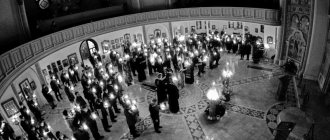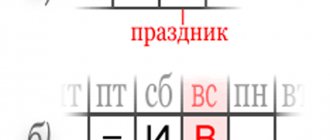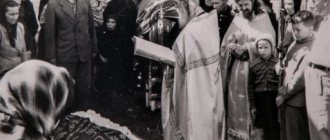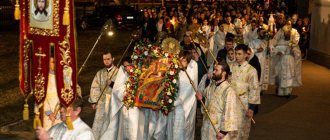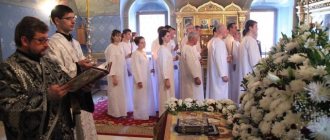CIRCLE OF WORSHIP OF THE HOLY CENTECOSTAL AND THEIR GENERAL FEATURES
Lenten hours are observed: on Monday, Tuesday, Wednesday, Thursday and Friday of the entire Holy Pentecost, on Monday, Tuesday and Wednesday of Holy Week, on Wednesday and Friday of Cheese Week (if these days of Cheese Week do not coincide with the Feast of the Presentation of the Lord or a temple holiday) .
1 hour is read at the end of Matins, immediately after the prayer of St. Ephraim the Syrian. Reader: “Come, let us worship” (3). Common psalms: 5, 89,100. Then the reader reads: “Glory, even now,” “Alleluia” (3), “Lord, have mercy” (3). “Glory”, then an ordinary kathisma is read. In the middle of the kathisma there is the usual singing of “Glory”. After reading 3 “Glories” of the kathisma, the reader ends: “Glory, even now,” “Alleluia” (3), “Lord, have mercy” (3). The priest pronounces the troparion of the (Lenten) hour: “Tomorrow hear my voice, my King and my God.” The choir repeats the troparion. Priest - first verse: “Inspire my words, O Lord, understand my calling.” The choir sings the troparion. Priest - second verse: “I will pray to You, O Lord.” The choir sings the troparion.
On the Feast of the Annunciation, the Temple Feast and the Feast of the Great Saint, the troparion of the hour is left out, the reader reads only the troparion of the holiday. On Raw Wednesday and Friday, the troparion of the hour is read, not sung.
Priest: “Glory to the Father and the Son and the Holy Spirit.” Reader: “And now. What shall we call Thee, O Blessed One.” Chorus: “Direct my feet according to Thy word” and other troparia.
On the Feast of the Annunciation, the Temple Feast and the Feast of the Great Saint (as well as on Cheese-Fast Wednesday and Friday), the troparion “My Feet” is read, not sung.
During the Week of the Cross, on Monday and Wednesday after “What shall we call Thee,” the veneration of the Cross is performed in the middle of the temple in front of the Cross. The priest, after the cruciform incense of the lectern with the Cross, instead of “Guide my feet,” sings “We bow to Your Cross, Master.” Then, even if the Annunciation or a temple holiday occurs on these days, the stichera for the veneration of the Cross are sung: “Come, faithful ones.”
Reader: Trisagion according to “Our Father”, Daily Theotokos (see Book of Hours), “Lord, have mercy” (40), “For all time”, “More honorable Cherub”.
On Monday, Wednesday and Friday of the Week of the Cross, the kontakion to the Cross is read at all hours after the Trisagion and the Lord's Prayer.
Priest: “God, have mercy on us” (reader: “Amen”) and the prayer of St. Ephraim the Syrian. Reader: Trisagion according to “Our Father”, “Lord, have mercy” (12). Priest: “Christ, the True Light.” Choir: “To the Chosen Voivode.” Priest: “Glory to Thee, O Christ God,” and so on. Great release. 3, 6 and 9 o'clock.
The 3 o'clock service has a full (usual) beginning, that is, after the exclamation of the priest, the reader reads: “Amen. Glory to Thee, our God, glory to Thee,” and so on.
Hours 6 and 9 begin with “Come, Let Us Worship.” Then at every hour there follows the reading of 3 ordinary psalms:
at 3 o'clock - 16,24,50.
at 6 o’clock – 53, 54, 90.
at 9 o'clock - 83, 84, 85.
And there is the versification of kathisma (kathisma is versified in the same way as in the 1st hour). At the ninth hour on all Fridays of the Holy Pentecost, on Monday, Tuesday and Wednesday of Holy Week, kathismas are not allowed. After the versification of the kathisma, the troparion of the hour (Lenten) is sung with the verses:
Troparion 3 hours: “Lord, Who sent down Your Most Holy Spirit at the third hour by Your Apostle: Do not take Him away from us, O Good One, but renew us who pray to You.” Verse 1: “Create in me a clean heart, O God, and renew a right spirit in my womb.” Verse 2: “Do not cast me away from Your presence, and do not take Your Holy Spirit from me.”
Troparion 6 hours: “And on the sixth day and hour on the Cross the daring sin of Adam was nailed to paradise, and tear up the handwriting of our sins, O Christ God, and save us.” Verse 1: “Give me my prayer, O God, and despise not my supplication.” Verse 2: “I cried to God, and the Lord heard me.”
Troparion 9: “Who at the ninth hour tasted death for our flesh, put to death our wisdom in the flesh, O Christ our God, and save us.” Verse 1: “Let my prayer come near to You, O Lord; give me understanding according to Your word.” Verse 2: “Let my petition come before You, O Lord; deliver me according to Your word.”
On Wednesday and Friday, these troparions are not sung, but read. On the feasts of the Annunciation, the temple and the great saint, the troparion of the holiday is read (the Lenten troparion of the hour is left out). After the priest says: “Glory,” the reader: “And now”: Theotokos of the hour.
On Holy Monday, Tuesday and Wednesday after the Virgin Mary hour there is a reading of the Gospel on the clock.
At the 6th hour after the Mother of God: “For the imams are not bold,” the troparion of prophecy is pronounced, then the prokeimenon is sung. Priest: “Let’s take a look.” Reader: “Tone 6: Save, O Lord, Thy people” (or another prokeimenon indicated along with the Triodion). The reader does not pronounce the word “prokeimenon”. The choir sings the prokeimenon. Priest: "Wisdom." And a paremia is read from the Book of the Prophet Isaiah. Then the second prokeimenon is sung, after which (at the 6th hour) the reader reads: “Soon let us be preceded.” The Trisagion according to the “Our Father”, the troparia of the day according to the Book of Hours and further, as at the first hour, only there is no dismissal after 3 and 6 o’clock. Before the prayer of St. Ephraim the Syrian, all the clocks shouted: “God, show mercy to us.”
At the 9th hour, the prayer of St. Ephraim the Syrian is read only once with 3 great bows, on other hours and pictorial: great bows - 4, small - 12. On holidays on the clock - only 3 great bows.
At 3, 6 and 9 o'clock after the prayer of St. Ephraim the Syrian, the prayer of the hour is read.
Nativity. Circumcision of the Lord and St. Basil the Great. Epiphany
The services of “Nativity” and “Epiphany” coincide almost completely in structure. These holidays are the center of the month (fixed circle) and in ancient times constituted a single holiday - Epiphany. They have 5 days of pre-celebration, very similar to Christmas Eve, only the post-celebration of Christmas is shorter than the post-feast of Epiphany due to the Feast of the Circumcision. Both Christmas and Epiphany are connected by holy days - Christmastide.
Statutory instructions for the holidays of Christmas and Epiphany:
The all-night vigil on whatever day occurs consists of:
Great Compline
Lithium
Matins
All-night vigil is celebrated at night (according to the Charter)
a) If the holiday falls on Sunday or Monday - Liturgy of Basil the Great
b) if from Tuesday to Saturday – Liturgy of St. John Chrysostom
c) if on Sunday – cancellation of Sunday service
d) if on Wed. and Fri. – cancellation of the post.
Zadostoynik: “Magnify my soul...” (Christmas and Epiphany)
Involved: “The Lord delivers the ambassador to his people. Hallelujah" (Christmas). “The grace of God appeared, bringing salvation to all men” (Epiphany)
Entrance verse: “from the womb... You are a priest forever, according to the order of Melchizedek”
All-night vigil. Great Compline: consists of 3 parts. Every part of it is concluded with prayer; The parts of Compline are divided among themselves by an appeal to those praying: “Come, let us worship...”. The first part of Great Compline is similar to that part of Matins, which begins with the Six Psalms, and at which “God is the Lord” is sung with troparia and the Psalter with sedals is sung. This similarity indicates that Great Compline arose on the basis of the Six Psalms and subsequently expanded to a tripartite composition. The first part is adjoined by a short second part of Compline, which in its content is repentant. The third part consists of glorifications and praise to God and the holy saints of God. It is similar to that part of Matins that begins with the singing of the canon.
Great Compline is performed as follows. The priest and the deacon, having put on their vestments, begin the process, as on all the Lord's feasts. The royal doors open, and the deacon, having given the priest a censer, with a candle in his hand goes out onto the solea, the word “Arise” is not pronounced, but immediately exclaims: “Bless, lord” and returns to the altar. Priest: “Blessed be our God...” and performs the full censing of the temple, as at the beginning of the all-night vigil. At the end of the censing, the royal doors are closed. The reader reads Great Compline: “Amen, Glory to Thee, our God, glory to Thee; Heavenly King" and other usual beginnings.
Scheme of Great Compline for Christmas (and Epiphany). I-part . After the usual beginning, six psalms are read: 4th, 6th, 12th. “Glory, and now”, “Alleluia” (3), “Lord, have mercy” (3), “Glory, and now” and psalms: 24th, 30th and 90th. Then: “Glory, even now,” “Alleluia” (3). "Glory, even now." Choir: “God is with us...” (royal doors open). The reader reads other verses, ending with the 20th verse: “Father of the next century.” Choir: choruses to each verse: “For God is with us” and after the final verse concludes by singing: “God is with us.” Reader: “The day is past...”, “I believe.” Verses: “Most Holy Lady Theotokos, pray for us sinners.” “All the heavenly powers of the holy Angels and Archangels, pray...”, etc. Then - the Trisagion according to Our Father. Chorus: Troparion of the holiday (The Royal Doors open). Reader: “Lord, have mercy (40). “Most honorable...” and reads the final prayer of St. Basil the Great: “Lord, Lord...” Part 2. Reader: “Come, let us worship,” psalms 50, 101, prayer of Manossiah, Trisagion according to “Our Father.” Instead of the troparia: “Have mercy on us, Lord, have mercy on us,” the kontakion of the holiday is sung (the Royal Doors open). Reader: “Lord, have mercy” (40), “Most honorable...” and reads the final prayer: “Master, God the Father Almighty.” 3rd part. Reader: “Come, let us worship,” psalms 69, 142 and daily doxology. After this, the clergy comes out for litia while singing the stichera of the holiday. The usual ending of Great Compline is omitted here. After the litia there is Matins, as at an ordinary festive all-night vigil.
Scheme of Matins for Christmas (and Epiphany). After the exclamation “The blessing of the Lord is upon you,” the Six Psalms. According to polyeleos - magnification: “We magnify Thee ,
Life-giving Christ, for our sake now born in the flesh from the brideless and most pure Virgin Mary.” Degree – 1st antiphon of the 4th tone: “From my youth...” Prokeimenon ch. 4 “From the womb before the morning star I gave birth to Thee...” Gospel (Matthew, ch. 2). According to the 50th Psalm, instead of “Prayers,” it is sung: “Glory: Every day joys are filled, Christ is born of the Virgin.” “And now” is the same, but the end: “Christ was born in Bethlehem...” Verse: “Have mercy on me, O God...”. And the stichera: “Glory to God in the highest, and on earth peace, today Bethlehem will receive Him who sits ever with the Father...” There are two canons - St. Cosmas of Maium and St. John of Damascus: the first with irmos on 8 and the other on 8, irmos on twice. According to the 3rd canto, ipakoi is sung: “The beginning of tongues”; according to the 6th, kontakion and ikos are sung. Instead of “Most Honest...” - the chorus: “Glorify, my soul, the Most Honest and Most Glorious of the hosts of the mountains, the Most Pure Virgin Mary.” And irmos: “I see a strange and glorious sacrament...” Each troparion of the first canon has its own choruses. The second canon has its own chorus: “Today the Virgin gives birth to the Lord...” The catavasia on the 9th canto is the irmos of the second canon: “Love for us, as if we are comfortable with fear, silence is more comfortable, but love, Virgin, weaves long-form songs, it is inconvenient to eat: but and, Mother, give me strength, as long as there is will.” This irmos “Love for us”, together with the first chorus of the 9th song, is the Zadostoynik in the liturgy. According to the 9th canto the luminary sings: “He visited us from above...” (three times). At the end of Matins, the dismissal of the holiday (see Service Book): “Who was born in a den, and reclined in a manger, for our salvation, Christ our true God...” and so on until the end.
Liturgy for the Nativity of Christ. Antiphons of the holiday: “Let us confess to You, O Lord, with all our hearts...” and so on. Entrance verse: “From the womb before the star I gave birth to Thee, the Lord swears and will not repent: Thou art a priest forever, according to the order of Melchizedek.” The troparion and kontakion of the holiday are sung immediately. Instead of the Trisagion - “Elits were baptized into Christ...”. Prokeimenon: “Let all the earth worship You...”, verse: “Shout to the Lord, all the earth, give glory to His praise.” Apostle (Galatians, chapter 209). Gospel (Matthew, part 3). Zadostoynik serves as the irmos of the 9th song of the canon: “Love for us” with choruses. Participated: “The Lord delivered the ambassador to His people.” Note: Antiphons, entrance, “Elitsa” are sung only on the day of the holiday.
Vespers on the day of the holiday (Service with great doxology). The day after the Feast of the Nativity of Christ, on December 26, the Synaxis of the Blessed Virgin Mary is celebrated. At Vespers, entrance with censer, great prokeimenon, tone 7: “Who is the great God, like our God? You are God, work miracles." At Matins, the canons of the holiday are both, as for the holiday itself. For the 9th song, we don’t sing “The Most Honest,” but we sing the choruses of the canons of the holiday.
On the celebration of the Nativity of Christ, as on the days of the celebration of all the twelve feasts (except for the Introduction), the entire service of the holiday is performed (the service of an ordinary saint is transferred to the previous day), but without entrance and paremias, there is no polyeleos and antiphons at Matins. At the end of Matins, stichera on praise and great doxology are sung.
Saturday and Sunday after the Nativity of Christ. On Saturday after the Nativity of Christ, the liturgy includes: the prokeimenon: “I will remember Your name in everyone...”, the verse: “Hear, daughters...”, the special Apostle (Tim. Ch. 288) and the Gospel (Matt., Ch. 46). Involved: “I will accept the cup of salvation...”. The week after the Nativity of Christ is also called the Week of the Holy Fathers. This Week commemorates the relatives of Christ according to the flesh from different times: the forefathers of Christ the prophet David, the holy righteous Joseph the Betrothed and Jacob, the brother of the Lord according to the flesh.
Christmas time. Twelve days after the feast of the Nativity of Christ (from December 25 to January 6) are usually called Christmastide, i.e. holy days, because these days are sanctified by the great events of the Nativity of Christ and the Epiphany, the celebration of which was shorter in ancient times, since the holidays of the Nativity of Christ and the Epiphany were combined on one day. After their separation, the celebration spread to all days in the interval from December 25 to January 6, and therefore they constitute, as it were, one day of the holiday. These days are called holy evenings because Christians, according to ancient custom, stopped their daytime activities in the evening, perhaps in memory of the events of the Nativity and Baptism of the Savior, which took place at night or in the evening. During the holidays up to January 4 inclusive, there is no fasting either on Wednesday or Friday.
The beginning of the celebration of Epiphany dates back to apostolic times. It is also mentioned in the “Apostolic Decrees”, which says: “Let the feast of the Epiphany be celebrated, since on that day there was the appearance of Christ’s Divinity, who testified to His Father in Baptism, and to the Comforter the Holy Spirit, in the form of a dove, who showed him to those who stood witness.” Holy Fathers: Anatoly, aphiep. Constantinople (V century), Andrew and Sophronius of Jerusalem (VII century), Cosmas of Maium and John of Damascus (VIII century), compiled the canons, and Germanus, Patriarch of Constantinople, Joseph the Studite, Theophanes and Byzantium (IX century) compiled many hymns for the feast of the Baptism of Christ, are still sung on the day of the holiday.
At Matins, according to the polyeleos, the magnification is sung: “We magnify You, Life-Giving Christ, for our sake now baptized in the flesh by John in the waters of the Jordan.”
Circumcision of the Lord and St. Basil the Great:
January 1 (14). This is not the twentieth, but a great holiday. One of a kind, because on this day the Lord's feast is combined with the feast of the saint - St. V. the Great. The Liturgy of St. Basil the Great is served at the polyeleos (at Matins) - preference is given to the saint (an unprecedented thing). The content of the texts, first of all, says that “the Creator of the law fulfills the law,” i.e. He who gave the law is its executor (“I came not to destroy, but to fulfill”)
Epiphany:
January 6 (19)
January 14 (27) – giving away.
Peculiarity:
Great Blessing of Water
The day after the Feast of the Epiphany, the Cathedral of St. John the Baptist (“Cathedral” in the statutory language means a meeting of believers in the temple for a “solemn vigil” in memory of the saint). At vespers on the day of the holiday (towards January 7th) there is an entrance with a censer and the great prokeimenon: “Our God in heaven and on earth, create all that He pleases.” The Saturday and Sunday following the Feast of the Epiphany are called Saturday and the Week of the Enlightenment. On these days, special Apostle and Gospel readings related to the holiday are read.
Ticket 10 question 2. Compline, its ideological meaning. Types of Compline and days of their celebration
Compline is a divine service of the daily cycle, which is performed according to the Rule after the evening meal (that is why it is called Compline, since it is performed “in the evening”). In Orthodox worship, there are two types of Compline: 1) great and 2) small .
The main meaning of Compline, which is expressed in one way or another in almost all psalms, prayers and hymns, is to thank God for the past day, repentance for sins committed and prayer for the coming sleep. Also in some places of Compline there is a prayerful appeal to the Mother of God about Her intercession for us before the Lord (the troparia that are sung at Great Compline after “Lord Almighty...”, as well as the prayer “Undefiled, Unblasphemous...”).
DAYS FOR PERFORMING THE GREAT COMPLEMENT: * 1. On the eve of Wednesday and Friday of Cheese Week (however, if the Presentation of the Lord occurs on one of these days, then Compline is not celebrated). * 2. All weekdays (Monday - Friday) of the Holy Pentecost in the evening (except for Wednesday and the heel of the 5th week, also with the exception of March 25 in the evening, on the eve of the Feast of the Annunciation). * 3. Maundy Monday and Maundy Tuesday in the evening. * 4. On Christmas Day and Epiphany as part of a vigil. DAYS OF PERFORMANCE OF LITTLE COMPline: * 1. During the period from Antipascha to the Sunday of the Empty Meat, it is celebrated every day, except for cases when it is necessary to perform an all-night vigil (on the eve of Sundays, great and vigil holidays). * 2. On Monday, Wednesday and Friday of Cheese Week (in the evening). * 3. On some days of Great Lent: all weeks in the evening, on Wednesday and the heels of the 5th week (performed in private), Great Wednesday, Great Thursday, Good Friday in the evening. Also, Little Compline is celebrated in the evening on the Feast of the Annunciation of the Most Holy Theotokos, on the eve of March 26, if the Annunciation itself occurs on the weekday of Great Lent (see Typikon, March 26, 3rd “see”). * 4. Little Compline is not celebrated on Holy Saturday in the evening (replaced by reading the book of the Acts of the Holy Apostles) and during Bright Week (replaced by the Easter hour).
Ticket 11 question 1. Liturgical Apostle. Reading of the Apostle at daily services. Contents and applications.
The liturgical Apostle contains 22 canonical books of the New Testament: the book of the Acts of the Holy Apostles, 7 cathedral epistles, 14 epistles of St. Paul. The entire Apostle is read throughout the year. was not included in the liturgical service
book of Revelation of John the Theologian.
The Apostle is always read before reading
Gospels, so it is never read. The Apostle was read without further reading. Gospels (however, reading one Gospel without the Apostle often happens).
When the Charter prescribes the reading of the Apostle:
-At Great Vespers (if it is not connected with the Liturgy) the Apostle is read in two cases: AT VESEN OF GOOD FRIDAY, THE EVE OF THE Nativity of CHRIST or THEOPHANY; if the holiday happens on Sunday or Monday, then Great Vespers is performed in the afternoon).
-At Compline or Midnight Office the Apostle is NEVER read
-At Matins, the Apostle is read once a year - on GREAT SATURDAY at the end of Matins after the procession with the Shroud.
-The Apostle is placed on the clock only on those days when the Great Hours are celebrated (3 times a year: ON THE EVEN OF CHRIST, THE EVEN OF THEOPHANY, GOOD FRIDAY).
-At the full liturgy (St. John the Golden, Vas. the Great) the Apostle is an integral part of the rite, it is always necessary, perhaps even the reading of 2-3 apostolic principles.
-At the Liturgy of the Presanctified Gifts, the Apostle is read ONLY IN THE CASE OF POLYELINE (February 24, March 9) or TEMPLE HOLIDAY.
The books of the New Testament are located in the Apostle. just like in Slavic and Russian. Bible: book of Acts, 7 epistles (James, 1 and 2 Peter, 1,2,3 John and Jude), 14 epistles of the Apostle Paul (Romans, 1,2 Corinthians, Galatians, Ephesians, Philippians, Colossians, 1,2 Thessalonians, 1,2 Timothy, Titus, Philemon, Hebrews). Before the book of Acts and each epistle there is placed: a brief summary of the book, information about the place, reason and purpose of writing the epistle. The division into chapters and verses in the Apostle is of secondary importance. As in the Gospel, the main division is into liturgical passages - conception. TITLE NUMBERS ARE INDICATED BY RED NUMBERS ON THE OUTER TEXT FIELD. Unlike the Gospel, the numbering began in the Apostle through, i.e. the same for all books. The last conception was Hebrews 335. The main thing is to KNOW the conception number; this alone almost always allows you to find the necessary reading. However, there are 4 pairs of concepts that have the same numbers (Acts 50 and 51 - James 50 and 51; 2 Pet. 68 - 1 John 68; Tit. 302 - Philm. 302). Some conceptions, as in the Gospel, do not have a separate number, but are located among other conceptions. This reading is called “CONCEIVED BY THE SEX”; in the text such a conception is marked with a conception sign without a number. In particular, at the liturgy on the 1st Sunday of Great Lent, the Epistle to the Hebrews is read, beginning 329 “from the floor , ” which begins with Heb. 11, 24, while 329 itself begins with Heb. 11, 17.
To determine and find the apostolic conception for a given day, you must use the Apostle's appendices, which contain all the necessary instructions.
8 appendices: 1. “The story of the antiphons, and of the prokeimenon, and how the Apostle should eat honor every day in the weeks of the whole summer” - ordinary readings of the moving circle of worship. Here we present first the prokeimenon, ordinary apostolic readings, alleluaries and sacraments from the period of the Colored Triodion, and for the moving Twelve Feasts of the Lord
The text of the antiphons is also given.
2. “Following the Holy Pentecost, Saturdays and weeks of Holy Great Lent .” Here are the prokeimenons, rows, apostolic readings, alleluaries and sacraments for the Saturday and Sunday days of Great Lent, and for the Week of the Holy Week. text of antiphons. 3. “Collection of the Twelve Months” - readings from the fixed circle of worship (months of words). Here are the prokeimenons, apostolic readings, alleluaries and communions of feasts and saints for every day of the year. To the Lord's twos. holiday the text of the antiphons is given. Since the church year begins on September 1, and ends on August 31, so does the month. On the days of remembrance of some minor saints, nothing is indicated in the month's book, then the day's prokeimenon, alleluary and communion are sung and only the ordinary reading is read. 4. “Prokeimeni and alleluiare risen, liturgy, osmia of voices.” Here are the prokeimenons and Sunday alleluaries of 8 voices, which are sung throughout the year at Sunday liturgies in accordance with the voice of the Octoechos. 5. “Prokeimeni, alleluiare and communion of the day.” Prokeimenons, alleluaries and sacraments for every day of the week, from Monday to Saturday, which are sung on the days of remembrance of the polyelean saints, with doxology, sixfold and minor, except for the periods of post-feast of the twelve feasts and the Colored Triodion. 6. “Prokeimeni, Apostles and Alleluiare, and share common communion with the saints, to whom we always serve . Used when used. General Menaion: when performing a vigil or polyeleos service to a saint without a sign or to a newly glorified saint. Here are given the complete verses of many prokeimenons and alleluaries, which in the month's book are indicated only by the initial words. 7. “Prokeimeni, Apostles and Alleluiare, for every need of distinction.” They are used here when performing the Sacraments, prayers and other private services. However, this application is almost never used, because in the sequence of each private service there are already texts of the prokeimenon, the apostle and the alleluary. 8. “Antiphons all the days.” Here is the text of the daily antiphons, which are sung on weekdays (except Saturday) in those cases when a service is performed to a saint without a sign, who is not ordered to sing “Blessed.” But it is still more convenient to sing daily antiphons according to Irmology.
Divine services during the weekdays of Great Lent. Chapter 49 of the Typicon. Vespers and Compline
Features of the weekday services of V.P.:
- lack of full liturgy (full if Annunciation)
— Liturgy of the Presanctified Gifts (Wednesday and Friday)
— The order of daily services is changing (in the absence of LPD, fine services are completed not after the 6th, but after the 9th hour)
– Black vestment (Roman Catholic tradition, adopted in the 18th century)
— At the end of each service of the daily circle, the prayer of St. Ephraim the Syrian, bows
— An abundance of prostrations to the ground (and without the prayer of Eph. Sir.), for example, the Standing of Mary of Egypt - during the reading of the canon, 738 prostrations.
— A special charter for reading the Psalter - read 2 times a week (see No. 51)
— Passion (dedicated to the remembrance of the sufferings of Christ) is Mon. Vespers with the entrance and the great prokemenon, with a prayer service for the troparions of dismissal, with the canon and reading of the Gospel. Takes place at 2,3,4,5 Sunday V.P.
On the days of Pentecost, the following main types of services are performed:
1. Great Compline.
3. Matins.
3. Fine clocks.
4. Vespers.
5. Liturgy of the Presanctified Gifts, as well as the Liturgy of St. John Chrysostom and St. Basil the Great.
Great Compline (usually separate from Matins) is celebrated on the evenings of Monday, Tuesday, Wednesday, Thursday and Friday during all weeks of Great Pentecost, with the exception of Thursday and Friday of the 5th week (Saturday of the Akathist).
Lenten hours are celebrated:
1. on Monday, Tuesday, Wednesday, Thursday and Friday during all weeks of Lent;
2. on Monday, Tuesday, Wednesday of Holy Week. (On Saturdays and Sundays, the hours are not Lenten, but daily).
The Liturgy of the Presanctified Gifts is celebrated only on the weekdays of Great Lent (except Saturday), namely:
1) on Wednesday and Friday of all weeks (from the 1st to the 6th Week inclusive) of Lent;
2) on Thursday of the 5th week (reading the great canon), with the exception of the case when the Annunciation falls on this day (then the Liturgy of the Presanctified Gifts is moved to Tuesday - the day of reading the great canon);
3) on Monday, Tuesday and Wednesday of Holy Week (except when they coincide with the Annunciation);
4) on the days of remembrance of saints with polyeleos (February 24 - Finding of the head of St. John the Baptist, March 9 - 40 martyrs and on the temple day, which occurred during the period from the 2nd to the 6th week of Lent (if these holidays happen on the 1st th week, then the service is moved to St. Demetrius Saturday).
Liturgy of St. John Chrysostom is celebrated on Saturday of the 1st and subsequent five weeks of Great Lent, as well as on Vaiy Sunday and on the Feast of the Annunciation, no matter what day it happens on, except for Sundays, Maundy Thursday and Great Saturday, since the liturgy is celebrated on these days St. Basil the Great. Liturgy of St. Basil the Great happens five times in St. Pentecost - on the first five Sundays of Great Lent and twice during Holy Week: on Maundy Thursday and Great Saturday (even if the Annunciation occurs on these days).
Liturgics. Lenten worship (period of singing the Lenten Triodion, until the week of Vaiy)
Shimansky G.I.
Introduction. Fast of the Holy Pentecost. Its antiquity, establishment and significance.
The Fast of the Holy Pentecost is called Great because of the special importance of its establishment.
The most ancient Christian writers unanimously testified that the fast of the Holy Pentecost was established by the apostles in imitation of the forty-day fast of the prophet Moses (Exodus, chapter 34), the prophet Elijah (3 Kings, chapter 19), and mainly - following the example of the Lord Jesus Christ (Matt. 4:2), who fasted for forty days.
The fact that this establishment is apostolic is evidenced by the 69th rule of the Apostles, which commands us to fast on the Holy Pentecost before Easter. In addition, the apostolic establishment of the fast of the Holy Quate and its observance by the entire Primitive Apostolic Church is indicated by the Fathers of the Church of the 1st – 6th centuries: Saint Ignatius the God-Bearer (1st century), Victor, Bishop of Rome (2nd century), Saint Dionysius of Alexandria, Origen (III century), Blessed Jerome, Saint Cyril of Alexandria (IV century) and many others.
The fact that the fast lasted exactly 40 days from the very beginning of its establishment also has evidence from the deepest antiquity. And the very name “Four Days” is found quite often in ancient written monuments. Saints Basil the Great and Gregory of Nyssa claim that the fast of Pentecost existed everywhere in their time. But special evidence of the antiquity of this fast is provided by the Easter circle of St. Hippolytus of Rome (III century), inscribed on his seat and containing an indication of the antiquity of the custom of breaking the fast of Pentecost on Sundays.
So, the fast of the Holy Pentecost has always been 40 days. Beginning in the 4th century, the Eastern Churches established the order of observance of Great Lent that exists to this day: from the Monday after Cheese Week until Holy Saturday inclusive. Thus, Great Lent consists of the forty-day fast itself (the Fourth Day) and the fast of Holy Week “for the sake of the saving passions” of Christ (St. Simeon of Thessalonica). In the Apostolic Decrees (book 5, chapter 1) it is said about Great Lent: “Let this fast (i.e., Lent) be accomplished before the fast of Easter (i.e., Holy Week), starting from the second day (i.e. from Monday) and ending on Friday; then the Holy Week of Easter begins (i.e., the week of Christ’s suffering). While fasting during it, everyone with fear and trembling offers daily prayers to those who sin.” In these decrees, Lent is presented as consisting of a forty-day fast and the fast of Holy Week. Saint Epiphanius of Cyprus writes: “The Church usually spends the Fourth Day until the seven days of Holy Easter (before Holy Week) in fasting. Moreover, the entire people spends six days of Pascha (Holy Week) in dry eating (Exposition of the Catholic Faith, XXII).
Since ancient times, the very way of observing the fast of the Holy Pentecost was determined. Ancient Christians observed this fast with particular strictness, abstaining even from drinking water until the ninth hour of the day (according to the current account, until the third hour in the afternoon). Food was eaten after the ninth hour, eating bread and vegetables, abstaining from meat and wine, as well as cheese and eggs, even on Saturdays and Sundays. The ancient practice of observing Great Lent is also reflected in our church charter (see Typikon, Chapter 32 “From the rules of the saints the apostle and the saints father about the Holy Great Pentecost, as every Christian must carefully (strictly) keep”). The Orthodox Church prescribes especially strict fasting in its charter on the days of the first and Holy Weeks. On Clean Monday and Tuesday of the first week, it is suggested to observe the highest degree of fasting: “It is not at all appropriate to eat.” During other weeks of fasting (except Saturdays and Sundays), eating once a day - in the evening (dry eating). On Saturdays and Sundays, it is allowed to eat boiled food with oil, and only twice a day. And only on the Feast of the Annunciation of the Blessed Virgin Mary, if it does not fall on Holy Week or Palm Sunday, is eating fish permitted. The consumption of meat, milk, cheese and eggs on Holy Pentecost is prohibited by the VI Ecumenical Council (Rule 56) on the basis of Apostolic Tradition.
The Church strictly condemns those who break the fast of the Holy Pentecost. The Council of Laodicea (canon 50) determined: “If a bishop, or presbyter, or deacon, or subdeacon, or reader, or singer does not fast for fourty days, he will be defrocked. If a worldly person does not fast, let him be excommunicated.” The book of church rules Nomokanone says: “If you eat meat or cheese on Great Pentecost or on Wednesday and Friday, you will not receive communion for two years” (Small Trebnik, rule 85).
But acting in the spirit of love and mercy of the Lord Jesus Christ, the Orthodox Church does not impose the rules of fasting in its entirety on the weak and does not exclude those who do not fast due to weakness from participating in the joy of communion and the celebration of Easter. These include children, the sick, the infirm and the elderly. But those who are weak in body, as well as those who are healthy, are especially obliged to maintain spiritual fasting from sins during Lent, as well as during other fasts, and to do deeds of love and mercy.
The Church, in numerous stichera and troparions of the services of the Holy Pentecost, explains the essence of true fasting as a time of spiritual feat of self-sacrifice, mortification of the desires of the flesh, as a means of spiritual growth. “Let us fast (brethren) with a pleasant fast, pleasing to the Lord: true fasting is alienation of evil, abstinence of the tongue, putting aside rage, excommunication from lusts, speaking (accusations), lies and perjury. This impoverishment (avoidance) is a true, favorable fast.” “Fasting,” says one ancient book, “makes a person moderate, sober, bashful, silent, chaste. Fasting tames lusts, moderates passions, increases holy desires, destroys vicious ones; puts everything inside us in order; removes corrupt thoughts, implants knowledge, extinguishes the fire of lust, fulfills thoughts with quiet calm and always protects from the storm of vices” (“Imperishable Food”).
“Lent has come - the mother of chastity, the accuser of sins, the preacher of repentance, the residence of Angels and the salvation of men.” “Abstain from harmful passions, from envy and hatred, from all malice, soul.”
Other stichera say: “while we fast physically, we will also fast spiritually,” for fasting consists not only in abstaining from food and enslaving “tormenting flesh,” but it also means “alienation of all material passions,” “climbing to the heights of virtues.” “Pure fasting - removal of sin, alienation of passions, love of God, diligent prayer, tears of tenderness and care for the poor.” “The time of repentance, and the intercessor of eternal life for us, is the Lenten feat, even if (if) we stretch out our hands for charity: nothing saves the soul like giving alms to those who demand (the needy). Alms, dissolved by fasting, delivers a person from death: we kiss (we greet) this, it is nothing else, for it is enough to save our souls.”
Many hymns of Lenten services are filled with deep repentant feelings in order to awaken in us feelings of repentance, tenderness and contrition for our sins. “How despondent, my soul, are you working against sin? And because of your weakness, you don’t come to the Doctor? This is an auspicious time, this is now the true day of salvation: arise, wash your face of repentance with tears, and illuminate (light) the oil of goodness: so that you may find cleansing from Christ God and great mercy.”
And at the same time, the Church in the hymns of the Holy Pentecost calls the time of fasting not sad, but “a time of joy.” Because “having been richly satisfied with luminous purity and pure love, luminous prayers, and all other virtues” (through true fasting), we join the light of Communion with God, the “sweetness of life” in Christ, our Lord and Savior.
THE CONCEPT OF THE LENTEN TRIODIUM
The services of Great Lent, as well as the preparatory weeks for it, starting from the first preparatory week about the Publican and the Pharisee and until Great Saturday, constituting a period of 70 days, are contained in a book called the “Lenten Triodion.”
The liturgical book “Triodion” (Greek “Triodion”, i.e. three-song) received its name “from the large number of three-songs contained in it,” as the compiler of the synaxarion of the Lenten Triodion, church writer of the 14th century, Patriarch of Constantinople Nikephoros Callistus explains (see Synaxarion per week about the Publican and the Pharisee).
The spread and use of the Triodion, as the Synaxarion indicates in the week of the Publican and the Pharisee, is due to Saint Cosmas of Maium (8th century), a contemporary of Saint John of Damascus. However, many three songs belong to earlier hymns, for example, St. Andrew of Crete, who owns the three songs at Compline on Vaiy Week, Great Monday, Great Tuesday, Great Wednesday and Great Friday, as well as the Great Canon read on the first and fifth weeks of Great Lent.
In the 9th century, the Monks Joseph and Theodore Studites collected together everything that had been written before them, put them in proper order, added many stichera and canons of their own work, and thus the Triodion was formed - a liturgical book containing about one hundred and sixty services of great and small ones, starting from the week of the Publican and the Pharisee and ending with Holy Saturday. In the 14th century, the Lenten Triodion was supplemented by synaxarions compiled by St. Nikephoros Callistos.
PREPARATORY WEEKS OF GREAT LENT
Preparation for the Holy Pentecost begins shortly after the feast of the Epiphany, in accordance with the fact that the Lord Jesus Christ, soon after His Baptism, withdrew into the desert for fasting, in memory of which the Pentecost was established. The Lent Day itself is preceded by four preparatory weeks: the Week (without week) of the Publican and the Pharisee; Weeks and Weeks: about the prodigal son, meat and cheese and cheese ("cheese").
During the preparatory weeks, the Church accustoms Christians to the feat of fasting by gradually increasing abstinence. After the Solid Week, fasts are restored on Wednesday and Friday, then it is forbidden to eat meat food, but it is allowed to eat dairy food on Wednesday and Friday.
Such special preparation for the fast of Pentecost is an ancient institution of the Church. The 4th century saints Basil the Great, John Chrysostom, Cyril of Alexandria and other Church Fathers left conversations and words spoken by them on the eve of a fast that has not yet come, but is only expected.
The canons and many other chants, which reveal the meaning of the preparatory weeks, were compiled in the 8th century. The Venerable Theodore and Joseph the Studites compiled services for the Week of the Prodigal Son, meat and cheese services, and in the 9th century, George, Metropolitan of Nicomedia wrote a canon for the Week of the Publican and the Pharisee.
CONTENT OF THE SERVICES OF THE PREPARATORY WEEKS OF THE HOLY QUARTECAST
Preparing believers for the Holy Pentecost, the Church in its services acts like a military leader, encouraging soldiers with wise and timely words for battle. Therefore, in the preparatory services, the Church says what can dispose believers to fasting, repentance and spiritual struggle. In her sacred memoirs, she goes back to the first days of the existence of the world and man, to the blissful state of the first parents and their fall, in order to show the beginning of sin and turn us to God. To awaken a feeling of repentance and contrition for sins during the days of the preparatory weeks, touching penitential stichera are sung at matins before the canon: “Open the doors of repentance... Instruct me in paths of salvation, O Mother of God... Many of the cruel things I have done...” For the same purpose, bringing together the seventy-day period of Lenten Triodion with Israel's seventy-year stay in captivity in Babylon, the Church in some preparatory weeks mourns the spiritual captivity of the new Israel by singing Psalm 136, “On the rivers of Babylon, there is a grumbling and weeping.”
THE WEEK ABOUT THE COLLECTOR AND THE PHARISEE
This preparatory Week received its name because during the Liturgy on this day the Gospel parable of the publican and the Pharisee is read (Luke 18:10-14).
Preparing people for fasting and repentance, the Church, through the example of the publican and the Pharisee, points to the true beginning and basis of repentance and all virtue - humility, and to the main source of sin and an obstacle to repentance and virtue - pride. “We conquer the Pharisee with vanity, and we bow down the publican with repentance, approaching You, the Only Master: but one (but one) boasted, lost his good things, but (the other) said nothing, - he was awarded gifts."
Pride breaks a person’s communication with God, the communication of love, and thereby isolates him from people, for there cannot be without love for God and love for neighbor. A person becomes an apostate, locked in his sinful, selfish will. This is stated in the chants of the service: “Every good thing is defecated (emptied) from heaving, but every evil thing is consumed from humility.” “Vanity wastes (causes a loss) the wealth of truth, but humility wastes (disperses) the multitude of passions.” “From the rot of passions the humble rises, but from the height of virtues every high-hearted person falls fiercely.”
God the Word, Himself humbled to the weakest state of human nature (to the “form of a servant”), showed humility as an excellent path to glorification (“exaltation”), and everyone who imitates Him, humbling himself, is glorified. Therefore, “to be humble in wisdom, be His disciple, even though the Tsar, chastising (teaching, teaching) everyone to be jealous of the publican’s sighing and humility.”
In the hymns of this Week, the Church calls to reject (“throw away”) highly praised pride, fierce (detrimental) exaltation, “greatly praised arrogance” and “vile arrogance”, and the Pharisees’ most evil, absurd ferocity (grandstanding) to God and (calls on) to acquire, to acquire “highly creative humility”, “meek, coexisting with humility” repentant feeling of the heart and tenderness.
PECULIARITIES OF THE SERVICE OF THE WEEK OF THE COLLECTOR AND THE PHARISEE
Beginning with the Week of the Publican and the Pharisee and during all the following preparatory Weeks of Great Lent, the hymns of the Octoechos are joined by the stichera and canon from the Lenten Triodion. At Matins, beginning with the Week of the Publican and the Pharisee and ending with the 5th Week of Great Lent, after the Gospel, singing “The Resurrection of Christ” Having seen” and the reading of Psalm 50, repentant troparia are sung, in which the repentant feeling is expressed with particular strength and depth. On “Glory”: “Open the doors of repentance for me” (instead of: “Through the prayers of the apostles”). “And now”: “On the path of salvation” (instead of “Prayers of the Mother of God”). Then - “Have mercy on me, O God” and “Many evil things I have done.”
The first song, “Open the doors of repentance,” is based on the parable of the publican and the Pharisee, from which all comparisons are borrowed to depict the feeling of repentance. The second song, “On the Path to Salvation,” is based on the parable of the Prodigal Son, and the third, “The many cruel things I have done,” is based on the Savior’s prediction of the Last Judgment. These penitential troparia are closely related to the Gospels, which are read on the preparatory Sundays for Lent: About the Publican and the Pharisee, About the Prodigal Son and About the Last Judgment.
Starting from the Week of the Publican and the Pharisee until the Sunday of All Saints, the Gospel stichera is sung before the 1st hour (on “Glory and Now”), since on the praises on “Glory” the Triodion stichera is sung instead of the Gospel stichera. At the Liturgy - the Gospel of the Publican and the Pharisee.
Thus, on the Sunday of the Publican and the Pharisee, four main features of the divine service can be noted: 1. The singing at Matins after the polyeleos and the Gospel of special penitential troparions. 2. Adding to the hymns of the Octoechos the hymns (including the canon) of the Lenten Triodion. 3. Reading at the Liturgy the Gospel parable of the publican and the Pharisee. 4. Permission to fast on Wednesday and Friday after the Week of the Publican and the Pharisee - a “continuous” week, or “omnivorous”, in order to expose the proud fasting of the Pharisee. 5. From the Week of the Publican and the Pharisee to the Sunday of All Saints inclusive, Sunday kontakia are not read, but are replaced at the hours, at Compline, at the Midnight Office and at the Liturgy (after entry) by “kontakia of the Triodion, and sometimes by kontakia of the Menaion, if the forefeast occurs on Sunday or an after-feast, or the memory of a great saint, or a temple saint (with the exception of the 5th and 6th Weeks). In the 4th and 5th Weeks of Pentecost, when there is a kontakion of the Triodion to the saint (St. John Climacus and St. Mary of Egypt), it is not sung with “And Now”: at the Liturgy after entering it should be sung with “Glory”, but with “ And now” sing the kontakion to the temple (if the temple of the Savior or the Mother of God) or the kontakion “The shameless representation of Christians” (if the temple of a saint). On Saturdays, starting from the Saturday following the Week of the Publican and the Pharisee, and until the Sunday of All Saints (after Pentecost), it is necessary to read the Gospel at the Liturgy in this order: ordinary Saturday, then the saint (Typicon, following the Week of the Publican and Pharisee).
From the Week of the Publican and the Pharisee to the Week of Vaiy, according to existing practice, the chorus “Have mercy on me, O God, have mercy on me” is added to the troparions of the canon of the Lenten Triodion on Sundays, and only on the Week of Orthodoxy and the Sunday of the Cross - the chorus “Glory to Thee, our God, glory to You." There is no specific indication in the charter and the Triodi on this matter.
THE WEEK AND THE WEEK OF THE PRODIGAL SON
On this Week, through the Gospel parable (Luke 15:11-32), from which the Week itself takes its name, the Church shows us an example of God’s inexhaustible mercy towards all sinners who turn to God with sincere repentance, and indicates that no sin cannot overcome God's love for mankind. Grace itself comes to meet a soul that has repented and turned from sin, imbued with hope in God; she kisses the soul, triumphs in reconciliation with it, no matter how sinful the soul may be. “Let us know, brethren, the power of the sacraments, for from sin the prodigal son who has risen (has come again) to his father’s house, the Most Good Father will kiss him, and again give the knowledge of His glory (differences): and the sacrament brings joy to the highest (powers), slaying the well-fed calf, so that we We will live together worthily (we will dwell together), to the philanthropic Father who sacrificed, and to the glorious Savior of our souls.”
The Church inspires that the true fullness and joy of a person’s life lies in his grace-filled union with God and in constant communion with Him (“may we coexist worthily”). Removal from this communication serves, on the contrary, as a source of all kinds of disasters and humiliations. “Oh, what blessings, you damned one, you have deprived yourself of! Oh, what a kingdom the passionate I have fallen away from! Having exhausted (wasted) wealth, I have received the commandment and transgressed. Alas for me, passionate soul! You will (later) be condemned by eternal fire. In the same way, before the end, cry out to Christ God: like the prodigal son, accept me, O God, and have mercy on me.”
Thus, on the Sunday of the Publican and the Pharisee, the Church reveals the true beginning of repentance, and now reveals its full power: subject to true humility and repentance, by the mercy of God forgiveness of the most serious sins is possible, and therefore no sinner, in view of the approaching time of repentance, should to despair of the gracious help and mercy of the Heavenly Father. “I ran away from Your Fatherly glory madly, squandering it on the wicked, even as You betrayed my wealth. In the same way, I bring the voice of the prodigal son: those who have sinned before You, generous Father, accept me repentant and make me as one of Your hired servants.” “The wealth that you gave me, grace, the accursed departed, indecently wickedly. Savior, having lived fornication, the demon flatteringly (having deceived the Father) wasted”, “and the accursed one obeyed (them), “and having become poor, they were filled with cold <…>: Likewise <…> turn to the cry of the generous Father: those who have sinned in heaven and before You" .
SERVICE OF THE SEEK ABOUT THE PRODIGAL SON
At Matins on the Sunday of the Prodigal Son and then on the Sunday of Meat and Cheese, after the singing of the polyelean psalms (134th and 135th) “Praise the Name of the Lord” and “Confess the Lord,” Psalm 136 “On the Rivers of Babylon” is also sung. with “red hallelujah.” After this, the Sunday troparia “Cathedral of Angels” are sung.
By this psalm, a sinful person is encouraged to realize his miserable state in the captivity of sin and the devil, like the Jews who realized their bitter situation in the captivity of Babylon and repented.
At Matins (after the 50th Psalm), the penitential troparia “Open the doors of repentance” are sung. At the Liturgy the Gospel parable of the prodigal son is read.
The week (Sunday) about the Prodigal Son includes a week (under the same name), which, as we have already indicated, is a continuous week (permission to fast on Wednesday and Friday).
WEEK AND MEAT WEEK
The Week after the Week of the Prodigal Son and the Week that concludes it are called Meat Weeks for the reason that they end the period of eating meat. Sunday itself is also called “meat empty” (Greek: release of meat, deprivation, cessation of eating meat). The Meat Week is also called the Week of the Last Judgment, for the corresponding Gospel is read at the Liturgy (Matthew 25:31-46). On Meat Saturday, before the remembrance of the Last Judgment of Christ, at which all the living and the dead will appear, the Church commemorates everyone from Adam to this day who has fallen asleep in piety and right faith.
The Church commemorates “from the ages the dead, all who lived piously by faith, and those who died piously, either in deserts, or in cities, or in the sea, or on earth, or in any place from Adam even to this day, who served God purely, our fathers and brethren , friends together and relatives, of every person who has served faithfully in life, and who has come to God in many forms and in many ways.” The Church diligently asks “for this (them) in the hour of judgment to give a good answer to God and to receive His presence in joy, among the righteous, and in the holy lot, bright and worthy of being His Kingdom.”
According to His inscrutable providence, God predetermined different demise for people. “It is fitting to know,” says the Synaxarion, “that not everyone who falls into the abyss and into fire, and into the sea, and the verbal destruction, and cold (cold) and famine, suffers from this by the direct command of God: this is more (for such are) the essence of God’s destinies, their ova (when some deaths) happen by the good will (of God), the ova (others) by permission, the other (deaths) for the sake of knowledge and rebuke (terrible warning), and the chastity of others.” “By the depth of Your destinies, O Christ, You, the All-Wise One, have predetermined the end of life, the limit and the image.”
On this Saturday, the Church, out of its love for humanity, especially prays for those dead who, for one reason or another, were not buried - “they did not receive legalized psalms and hymns of memory.” The Church prays “to teach some of the righteous,” “even though the water is covered, the battle is repressed, the coward is embraced, and the murderers are killed, and the fire is caught”; prayers are offered for those who “in ignorance and (not in their own) mind” ended their lives, for those whom the Lord, “knowing everything useful,” allowed to die by sudden death, “from sadness and joy that passed unreliably (unexpectedly)”, and about those who died at sea or on land, on rivers, springs, lakes, who became the prey of animals and birds, killed with a sword, struck by lightning, frozen in the cold and in the snow, buried under an earthen collapse (“strapped plinth or dust dust "), poisoned, strangled, hanged, or died from any other type of unexpected and violent death.
The thought of the end of our life while remembering those who have already passed into eternity has a sobering effect on everyone who has forgotten about eternity and has clinged with all their soul only to the perishable and fleeting. “Come before the end, all you, brethren, having seen our dust, and our weak nature, and we will see our weakness and the end, and the organs of the vessel are dense (carnal), and like dust is man, eaten by worms, and corruption, like dry bones are our every kind ( at all) without breath. Let us delve into the graves: where is the glory, where is the kindness (beauty) of the eye? Where is the gracious (eloquent) tongue? Where are the eyebrows, or where is the eye? - all dust and canopy. Likewise, O Savior, have mercy on all of us.” “Why is a man deceived when he boasts? Why is he embarrassed in vain? - the clay itself (will become) less (soon). Why does not dust, like dust, think of mixing, and the deposition of pus and decay (form)? If we are men who are slaughtered, why should we cling to the earth? And if we are related to Christ, why are we not kin to Him? And everyone has rejected the temporary and current life, the imperishable life that follows, even Christ is the Enlightenment of our souls.”
In terms of its sequence, the service on Meat Saturday is the same as on the Saturday before Pentecost, with the difference that on Meat Saturday, together with the hymns of the Lenten Triodion, the hymns of the Octoechos of the ordinary voice are sung, and on the Saturday before Pentecost, the hymns of the Colored Triodion are combined with the hymns of Saturday Octoechos certainly has 6 voices.
Page 1 - 1 of 5 Home |
Prev. | 1 | Track. | End | All © All rights reserved

